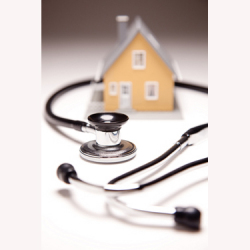

Improving housing conditions in Wales could save the NHS millions of pounds a year by reducing physical and mental illness caused by poor living conditions, according to a new report from BRE Trust.
Improving housing conditions in Wales could save the NHS millions of pounds a year by reducing physical and mental illness caused by poor living conditions, according to a new report from BRE Trust.
Problems caused include issues caused by dangerous stairs and steps as many homes are poorly designed, in bad condition or on sloping ground.
According to the report, 'The Cost of Poor Housing in Wales', this costs the NHS £67 million a year, or about 5% of the budget for primary healthcare in Wales.
An author of the report, Maggie Davidson, said: "This research shows that Wales continues to suffer some of the poorest housing in the UK.
"Largely due to the age and construction of the stock, as well as the impact of topography and weather, it has a disproportionately high number of poor homes with falls and damp hazards compared to England."
The report found that simple home safety improvements such as handrails on dangerous stairs and steps, hard-wired smoke and carbon monoxide detectors as well as better home security are cost-effective.
Published by IHS BRE Press, this report summarises the results of a research project to apply a methodology to calculate the cost of poor housing in England to the Welsh housing stock.
The project developed a model to allow these costs to be calculated, estimated the cost to mitigate these hazards, and calculated how long it would take for the NHS to benefit from directed repairs.
The benefit to the whole of society each year is likely to be over £160 million, taking into account poorer educational attainment and life chances caused by poor housing.
If you'd like to keep up-to-date with the latest developments in the heating and plumbing industry, why not subscribe to our weekly newsletters? Just click the button below and you can ensure all the latest industry news and new product information lands in your inbox every week.